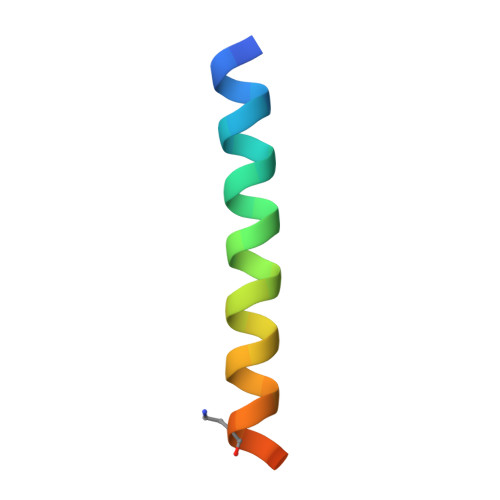Navigating the Structural Landscape of De Novo alpha-Helical Bundles.
Rhys, G.G., Wood, C.W., Beesley, J.L., Zaccai, N.R., Burton, A.J., Brady, R.L., Thomson, A.R., Woolfson, D.N.(2019) J Am Chem Soc 141: 8787-8797
- PubMed: 31066556
- DOI: https://doi.org/10.1021/jacs.8b13354
- Primary Citation of Related Structures:
6Q5H, 6Q5I, 6Q5J, 6Q5K, 6Q5L, 6Q5M, 6Q5N, 6Q5O, 6Q5P, 6Q5Q, 6Q5R, 6Q5S - PubMed Abstract:
The association of amphipathic α helices in water leads to α-helical-bundle protein structures. However, the driving force for this-the hydrophobic effect-is not specific and does not define the number or the orientation of helices in the associated state. Rather, this is achieved through deeper sequence-to-structure relationships, which are increasingly being discerned. For example, for one structurally extreme but nevertheless ubiquitous class of bundle-the α-helical coiled coils-relationships have been established that discriminate between all-parallel dimers, trimers, and tetramers. Association states above this are known, as are antiparallel and mixed arrangements of the helices. However, these alternative states are less well understood. Here, we describe a synthetic-peptide system that switches between parallel hexamers and various up-down-up-down tetramers in response to single-amino-acid changes and solution conditions. The main accessible states of each peptide variant are characterized fully in solution and, in most cases, to high resolution with X-ray crystal structures. Analysis and inspection of these structures helps rationalize the different states formed. This navigation of the structural landscape of α-helical coiled coils above the dimers and trimers that dominate in nature has allowed us to design rationally a well-defined and hyperstable antiparallel coiled-coil tetramer (apCC-Tet). This robust de novo protein provides another scaffold for further structural and functional designs in protein engineering and synthetic biology.
Organizational Affiliation:
School of Chemistry , University of Bristol , Cantock's Close , Bristol BS8 1TS , United Kingdom.
















